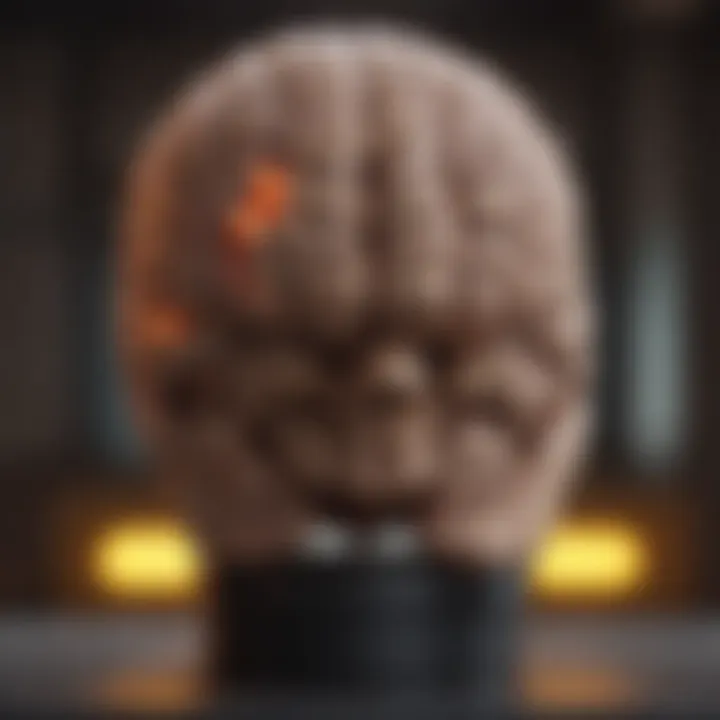Enhance Your Mind: Top Cognitive Exercises


Intro
In today’s fast-paced world, having a sharp mind isn’t just an asset; it’s becoming a prerequisite for success. Mental agility allows us to think on our feet, adapt to new situations, and solve problems with ease. But how can we enhance this crucial skill? Enter cognitive exercises. These activities are not just busywork; they serve a vital function in fostering brain health and improving overall cognitive function.
Studies have shown that regular engagement in mental workouts can lead to improved memory, better problem-solving skills, and sharper decision-making abilities. This article dives deep into various cognitive exercises, aiming to present readers with practical strategies that cater to different levels of mental engagement. Whether you’re a student looking to boost your focus or a professional seeking to improve your analytical skills, there’s something here for you.
Before we begin exploring the myriad of exercises that can spruce up your cognitive abilities, it’s essential to unpack the methodology that underpins our understanding of how these exercises benefit our brains.
Methodology
Study Design
To shed light on the effectiveness of cognitive exercises, various studies have employed a combination of qualitative and quantitative approaches. Researchers often utilize randomized controlled trials to measure the impact of specific cognitive tasks on participants' mental agility. These studies typically last anywhere from a few weeks to several months, allowing for a thorough exploration of both short-term and long-term effects.
Data Collection Techniques
Data is often collected through a mix of self-reporting questionnaires and objective measures like neuropsychological tests. Participants might document their experiences and feelings before and after engaging in various cognitive tasks. Objective testing may include memory assessments, attention tasks, and reasoning challenges designed to quantify improvements. Additionally, advanced imaging techniques like functional MRI scans help visualize brain activity during these tasks, offering insights into how cognitive exercises alter neural pathways.
Discussion
Interpretation of Results
Overall, the findings consistently suggest a positive correlation between regular cognitive exercise and enhanced mental agility. Many studies reported improvements in areas such as working memory, flexibility of thought, and processing speed among participants who engaged in structured mental activities. Moreover, certain exercises appear particularly beneficial for older adults, potentially staving off cognitive decline as they age.
Limitations of the Study
However, it's important to acknowledge that not all research is created equal. Some studies suffer from small sample sizes, limiting the generalizability of their findings. There are also variances in the types of cognitive exercises used across studies, which can complicate direct comparisons. It’s also crucial to consider individual differences; what works wonders for one person may not have the same impact on another.
Future Research Directions
Future studies may delve deeper into the specific mechanisms by which cognitive exercises enhance mental agility. Exploring different demographics could yield valuable information about tailoring exercises for varied needs, whether it be for students, professionals, or the elderly. Additionally, examining the effects of combining physical activity with cognitive tasks could provide a holistic understanding of brain health.
Observing these methodologies and results paves the way for a comprehensive understanding of how cognitive exercises ratchet up our mental prowess. Following sections will explore specific exercises, offering readers the tools they need to enhance cognitive functioning in daily life.
Understanding Cognitive Function
Cognitive function refers to the mental capabilities that allow us to process information, pay attention, reason, learn, and solve problems. Understanding these functions is crucial, especially when discussing mental agility and cognitive exercises. With aging and various environmental factors, cognitive function can decline, which leads to challenges in daily activities. Thus, it becomes increasingly important to explore how cognitive exercises can bolster this function.
In essence, cognitive exercises serve not only as drills for the brain but also as daily workouts to maintain and enhance mental clarity. By diving into cognitive function, we can identify specific areas to target with exercises that not only sharpen the mind but also can improve our overall everyday experiences.
What is Cognitive Function?
Cognitive function encompasses a multitude of mental processes that involve understanding and interacting with the world. These functions include how we acquire knowledge, process sensory information, memorization, and other core aspects of thinking. It is a broad term that defines the peak of our mental abilities and plays a critical role in how we manage tasks of varying complexities in life.
Components of Cognitive Function
Cognitive function can be broken down into several vital components, each contributing uniquely to mental agility. Here’s a closer look:
Memory
Memory is the cornerstone of cognitive function, allowing us to retain information and experiences for future use. It's not just about recalling names or dates; memory shapes our skills, beliefs, and knowledge.
Key Characteristic: One of the primary aspects of memory is its dual nature—short-term and long-term.
Benefits in This Article: Memory exercises, such as playing memory games or using apps designed for memorization, enhance retention capabilities, making it a popular pick in cognitive training.
Unique Feature: What stands out about memory is its adaptable nature; engaging in memory exercises can lead to significant improvements in everyday recollection, thus aiding in better decision-making.
Attention
Attention is an essential part of processing the world around us. It dictates how we focus on particular stimuli and filter out distractions. In an age bombarded with information, the ability to concentrate has become increasingly crucial.
Key Characteristic: Attention can be categorized into sustained, selective, and divided attention, each serving different purposes in our daily tasks.
Benefits in This Article: Exercises that improve attention, such as focused meditation or specific mindfulness practices, are widely recognized for helping individuals enhance their focus and overall mental clarity.
Unique Feature: One of the unique features of attention is its trainable nature; with consistent practice, it��’s possible to see notable improvements in daily activities, benefiting both personal and professional arenas.
Reasoning


Reasoning is the process of drawing logical conclusions and understanding cause-effect relationships. It plays a substantial role in how we make decisions and solve problems.
Key Characteristic: Reasoning can be divided into inductive and deductive reasoning, showcasing different ways to approach solutions.
Benefits in This Article: Engaging in challenges that require reasoning, such as puzzles or brainteasers, stimulates this component and enhances cognitive capabilities.
Unique Feature: Notably, reasoning exercises can sharpen not just abstract thought but practical problem-solving skills, making them highly applicable in real-world scenarios.
Problem-Solving
Problem-solving is a multifaceted skill that allows us to address challenges and find effective solutions. It is a culmination of memory, attention, and reasoning.
Key Characteristic: Effective problem-solving often involves critical thinking and creativity, enabling flexible approaches to complex scenarios.
Benefits in This Article: Problem-solving exercises, such as logic puzzles, foster resilience and adaptability, making them valuable in both educational and professional contexts.
Unique Feature: The ability to solve problems under pressure can be enhanced through practice, improving not just cognitive agility but boosting confidence in decision-making abilities as well.
The Importance of Cognitive Health
An agile mind is an agile life. Cognitive health is paramount as it influences how we engage with the world. It affects how we learn new skills, adapt to changes, and cope with life's hurdles. Maintaining cognitive health means investing time in exercises that enhance mental function, ultimately ensuring a richer and more fulfilling life. As we glean through activities aimed at enhancing cognitive health, we uncover that each component plays an integral role in creating a balanced, sharp, and engaged mind.
Types of Cognitive Exercises
Cognitive exercises are like workouts for the brain, essential for maintaining and enhancing mental agility. They engage various areas of cognitive function including memory, problem-solving, and attention. Integrating diverse exercises into daily life can promote a well-rounded cognitive enhancement. This section emphasizes the significance of different types of cognitive exercises, underscoring their advantages for various demographics. By thoughtfully selecting exercises tailored to individual needs, one can foster better memory retention, sharper problem-solving skills, and heightened focus, ultimately leading to greater mental resilience.
Memory Games and Activities
Memory is a key player in the cognitive race. Memory games and activities are designed to sharpen this crucial ability. They help train the brain to retain information more effectively and improve overall cognitive function.
Digital Memory Apps
Digital memory apps have made headlines in the cognitive training arena. They offer interactive and often gamified experiences, which make brain training approachable. Apps like Lumosity and Peak provide tailored exercises focused on memory improvement and daily challenges that keep users engaged.
One standout feature of digital memory apps is their accessibility. People can practice anywhere, whether it's during a commute or while waiting in line. However, some may find these apps less engaging after prolonged use, which could potentially hamper motivation over time.
Traditional Memory Games
On the other hand, traditional memory games like card-matching or even simple face-memory games have stood the test of time. These games draw on social interaction, making them not just mentally challenging, but also enjoyable to play with friends or family.
A unique aspect of traditional memory games is their tactile nature, which can appeal to those who prefer physical interaction over screens. However, they may require more effort to set up and play compared to their digital counterparts.
Problem-Solving Challenges
Diving into problem-solving challenges can reshape how we tackle daily obstacles. Engaging in these activities enhances critical reasoning skills while also boosting overall mental agility.
Logic Puzzles
Logic puzzles, such as Sudoku or riddles, challenge the brain to think creatively and analytically. They encourage players to uncover patterns and solutions, making them a superb choice for cognitive exercises.
The beauty of logic puzzles lies in their variety; they can be adjusted for difficulty and are often available in print or online formats. Yet, for some, the abstract nature of these puzzles may lead to frustration rather than fun, potentially discouraging ongoing engagement.
Mathematical Puzzles
Mathematical puzzles also present a formidable challenge, providing mental gymnastics that keep the brain agile. From classic brain teasers to complex equations, these puzzles require individuals to apply logic and numerical understanding, strengthening mathematical reasoning.
One key characteristic of mathematical puzzles is their versatility; they can often be adjusted for all ages and skill levels. However, the downside might be that individuals who struggle with numbers may find these puzzles less enjoyable and more daunting.
Language and Vocabulary Exercises
The realm of language and vocabulary exercises enhances communication skills and cognitive clarity. Developing a robust vocabulary not only aids in articulation but also supports overall mental sharpness.
Crossword Puzzles
Crossword puzzles are quintessential in this domain. They engage an expansive range of vocabulary while requiring individuals to connect words with meanings, effectively blending memory and language skills.
Crosswords can easily be found in newspapers and online platforms, making them widely accessible. However, if someone is not a frequent puzzle solver, they might feel overwhelmed by obscure clues or terminology, which can stifle enjoyment.
Vocabulary Tests


Vocabulary tests, including quizzes and flashcards, also serve to bolster language skills. They often adapt to different learning styles, whether through writing or auditory reinforcement, pleasing a wide audience.
The unique feature of vocabulary tests is their focused nature; they specifically target retention and understanding of words, without the elaborate configurations typical of games. But, some might find them a bit stark or lacking engagement compared to more dynamic exercises.
Attention and Focus Activities
Activities focusing on attention and concentration not only alleviate distractions but also heighten awareness in everyday life. Such exercises are vital for building a more resilient mental capacity.
Meditation Techniques
Meditation is well-known for its soothing properties, but it also profoundly aids cognitive function. Techniques like mindfulness meditation help improve focus and reduce stress, creating a more favorable cognitive environment.
A key characteristic of meditation is its simplicity; it requires no expensive materials and can be done anywhere. The challenge, however, lies in the discipline required to practice regularly, as initial attempts can feel unproductive or frustrating to some.
Mindfulness Exercises
Mindfulness exercises, similar to meditation, encourage individuals to live in the moment, which enhances their ability to concentrate. Engaging in practices such as mindful breathing and observation can redirect the mind and bolster attention.
One of the hallmark features of mindfulness exercises is their applicability to various everyday situations, from eating to walking. Yet, some may find it hard to maintain this level of focus amidst distractions, making consistency tricky.
Ultimately, each type of cognitive exercise offers unique benefits and can significantly contribute to mental agility. Selecting the right one requires understanding individual preferences and cognitive needs.
Scientific Basis for Cognitive Exercises
Understanding the scientific underpinnings of cognitive exercises provides individuals with valuable insight into how these activities enhance mental agility. It goes beyond mere anecdote and taps into a wealth of rigorous research underpinning the benefits of keeping one’s brain active. The importance of this topic cannot be overstated; as we explore cognitive exercises, grasping the evidence behind their effectiveness allows for informed choices in daily routines.
Research Studies on Brain Exercise
Numerous studies have illuminated the relationship between cognitive exercises and brain health. Research published in The Journal of Aging and Mental Health highlighted that older adults who engaged in regular brain training exhibited significant improvement in their processing speed and memory retention compared to those who did not partake in such activities.
- For instance:
- A study conducted by the National Institutes of Health showed participants who practiced mental activities, such as puzzles and reasoning exercises, had a reduced risk of dementia.
- Another research project demonstrated that older adults engaging in memory training had better functional connectivity in their brains, suggesting enhanced communication between different brain regions.
These studies underscore the need to embrace cognitive exercise as a tool for fitness—inclusive of the mind.
Neuroscience Perspectives
From a neuroscience viewpoint, cognitive exercises stimulate the brain’s neural pathways. The brain exhibits a remarkable ability to adapt structurally and functionally; this phenomenon, known as neuroplasticity, reflects how engaging in specific mental tasks can forge new neural connections. This adaptability is essential not just for learning but also for recovering from injuries and aging gracefully.
"Neuroplasticity allows the brain to reorganize itself by forming new neural connections throughout life, supporting cognitive health and resilience in the face of aging."
Research indicates that activities such as learning a new language or picking up a musical instrument can spur the development of increased gray matter in the brain, particularly in regions associated with memory and decision-making. This reinforces the idea that continual learning and mental challenges can lead to prolonged cognitive fitness.
Cognitive Plasticity and Aging
As individuals age, cognitive decline often becomes a looming concern. But findings from psychologists and neuroscientists reveal that the brain retains its plasticity, suggesting that mental exercises can stall or even reverse some aspects of cognitive deterioration associated with aging. Evidence shows that older adults who regularly challenged their minds—whether through complex games or problem-solving—demonstrated slower decline rates in reasoning and memory abilities.
- Consider these key points:
- Engage in varied cognitive exercises to target multiple brain functions: memory, attention, and problem-solving.
- Create an enriching environment through social interactions, continuous learning, and stimulating activities.
- Acknowledge that while cognitive decline can be part of aging, it is not an inevitable fate; proactive mental engagement does offer a buffer.
In summary, understanding the scientific basis of cognitive exercises empowers individuals. The research highlights that just as muscles require exercise to remain strong, so too does the brain. Adopting a mindset that embraces lifelong learning through various cognitive exercises is not only beneficial; it can potentially reshape the aging process itself, paving the path for improved mental agility.
Incorporating Cognitive Exercises into Daily Life
Integrating cognitive exercises into the hustle and bustle of daily life serves not just the mind but one's overall well-being. Cognitive agility, much like physical fitness, requires consistent effort and mindful practice. The truth is, modern life can become a monotonous loop, where individuals may forget to challenge their minds as they navigate their everyday tasks. Incorporating these exercises establishes a routine that not only sharpens cognitive skills but contributes to a more engaged and satisfying life.
One of the significant benefits of making cognitive exercises a part of daily life is the enhancement of mental resilience. With regular practice, you foster a brain that adapts and responds better to stress. For instance, folks who regularly partake in problem-solving activities often report feeling more confident in their ability to tackle unexpected challenges. Incorporating such exercises is about more than merely keeping busy; it’s about nurturing a brain that can think on its feet.
Another notable advantage is the ability to increased focus and productivity. When cognitive exercises are woven into daily routines, this can lead to profound shifts in attention span. More people are finding that a bit of mental gymnastics can go a long way, particularly in workplaces where focus is paramount.
Creating a Routine
Establishing a routine for cognitive exercises is no small feat, but it pays off handsomely. It starts with setting aside specific times during the day that are dedicated solely to mental activities. Just like you would schedule a workout, mark those time slots on the calendar. For some, mornings are prime for engaging the brain, while others may find late afternoons or evenings to be more suitable.
To keep it interesting, a mix of exercises can be employed. Rotate through various activities such as memory games, logic puzzles, or language challenges depending on the day. This helps prevent the routine from becoming stale. Attention should also be placed on the environment; a quiet space free from distractions can further amplify focus and efficiency.
Using Technology for Cognitive Exercises


With the prevalence of smartphones and tablets, it's no wonder technology has stepped up as a powerful ally in cognitive training. Many people find that using technological resources—or a mix of both—enriches their experience. Let's delve deeper.
Cognitive Training Apps
Cognitive training apps are a prime example of how technology can aid brain function. These apps, like Lumosity or Peak, have been crafted specifically to enhance various cognitive skills. One of the most appealing aspects of these apps is their adaptability; they often adjust to the user’s performance level, providing just the right amount of challenge, whether one is a seasoned puzzle enthusiast or a newcomer.
The unique feature of cognitive training apps is their gamified approach, turning exercises into engaging activities that feel less like chores and more like games. This element of fun can keep individuals motivated over the long haul. However, one must be cautious; reliance solely on technology without real-life engagement can lead to limitations in true cognitive development. It's a balancing act.
Online Resources
Online resources present another way to explore cognitive exercises, offering a broad spectrum of activities that can be tailored to almost any interest. Websites that host brain games or quizzes not only provide a sense of community but also allow for peer interaction, which is crucial for enjoyable learning.
These resources often contain unique features, such as forums for discussions or challenges that encourage collaboration. The advantage here is evident; from the convenience of access to the wealth of diverse exercises available, users can curate their cognitive experience to suit personal preferences. However, it's also important to navigate these resources wisely, as the quality can vary significantly from one site to another. Some might find an overload of information to be overwhelming rather than beneficial.
Social Interaction as a Cognitive Booster
The role of social interaction in boosting cognitive abilities cannot be overstated. Engaging in conversations, playing games with friends, or even participating in clubs can be immensely beneficial. Not only does it make the experience more enjoyable, but the exchange of ideas stimulates critical thinking and keeps the brain sharp.
Research indicates that socializing activates various regions of the brain, promoting both mental and emotional health. It is this interaction—whether through formal settings like group classes or informal settings like game nights—that can provide the extra push one needs to keep their cognitive engagement fresh and invigorating.
Challenges and Considerations
When diving into the world of cognitive exercises, one must tread carefully, almost like walking a tightrope. Understanding the challenges and considerations associated with cognitive training lays the groundwork for a fruitful mental enhancement journey. Not all exercises hold the same value for every individual; thus, assessing personal needs, recognizing potential limitations, and maintaining motivation are crucial factors for success.
Assessing Cognitive Needs
Assessing your cognitive needs isn't just a checkbox activity; it's a deep dive into understanding your own mental landscape. It's important to first identify specific areas where improvement might be desired. Are you struggling with memory retention or perhaps you find it hard to focus? Conduct informal self-assessments or engage in simple tests to pinpoint your strengths and weaknesses. Tools such as online cognitive assessments can provide a baseline for your brain's current performance.
Customized strategies can be developed more effectively when you know the areas requiring attention. For instance, if you have a background in mathematics but find verbal reasoning difficult, concentrating on language and vocabulary exercises will yield better results than generic brain games. Understanding your cognitive profile enables a more tailored approach, ensuring that your efforts are directed toward areas likely to provide the most benefit.
Potential Limitations of Cognitive Exercises
Cognitive exercises, no matter how engaging or intriguing, have limitations. It's not just about pushing the brain to its limits; one must recognize that improvement may not be linear. Research and anecdotal evidence suggest that while some may experience remarkable gains, others might feel as if they're merely treading water. Factors like age, existing cognitive impairments, or medical conditions can significantly impact how effective these exercises become.
Furthermore, the quality and authenticity of the exercises themselves can't be overlooked. The internet is awash with apps and programs promising "mind-blowing" results, but not all of them are scientifically backed. An exercise's value isn't just in its challenge but also in its relevancy to your needs. Relying solely on flashy digital games without understanding their purpose can lead you astray, creating more frustration than benefit.
"When it comes to cognitive training, it’s essential to maintain realistic expectations. Not all roads lead to brain enlightenment; some may lead to frustration."
Maintaining Motivation and Engagement
The path to cognitive enhancement can sometimes feel like running uphill. Therefore, finding ways to maintain motivation is paramount. Setting tangible goals is one way to keep the fire burning. Celebrate small victories in your cognitive journey. Whether it’s mastering a new word or solving a tough puzzle, acknowledging progress injects energy into your routine.
Another useful tactic involves the incorporation of social elements. Engaging with others—friends, family, or online communities—can provide a fun competitive edge or a support system. Imagine challenging a friend to a weekly crossword puzzle or setting up a game night centered around brain games. Sharing the journey often alleviates the mundane grind of solitary practice.
Finally, don't hesitate to mix things up. Predictability can dull the sword of cognitive training. Integrate a variety of exercises into your routine instead of sticking to just memory games or logic puzzles. Variety adds an element of surprise and can reignite interest. The key is to ensure that the exercises remain stimulating and not feel like an obligation.
Thus, by understanding one’s cognitive needs, recognizing limitations, and keeping the motivation alive, the journey of improving mental agility can transition from a burdensome chore into an enriching adventure.
Future Directions in Cognitive Training
As we move further into the 21st century, there’s a palpable shift in how we understand and approach cognitive training. The concept isn’t static; it evolves, shaped by advances in technology, shifts in educational paradigms, and emerging insights from neuroscientific research. Understanding these future directions in cognitive training can be pivotal for students, researchers, educators, and professionals, bridging the gap between theoretical knowledge and practical application.
Emerging Technologies in Cognitive Exercises
The integration of advanced technologies in cognitive training heralds a new age of mental exercise. Virtual reality (VR) stands out as a prime example, offering immersive environments where users can engage in task-oriented scenarios that stimulate their cognitive functions. Imagine wandering through a VR maze, requiring you to solve problems to advance—this not only tests working memory but enhances spatial awareness as well.
Moreover, augmented reality (AR) applications increasingly permeate the cognitive training landscape. Games that blend the real and digital worlds can prompt users to learn in context, making problem-solving activities more relevant. Brain training apps like Lumosity and Peak are not mere novelties; they provide tailored exercises based on user performance, utilizing algorithms that can identify weaknesses and reinforce strengths in cognitive capacities.
Advancements in Scientific Research
As researchers delve deeper into how the brain functions, significant advancements present promising avenues for boosting cognitive agility. Recent studies reveal that cognitive training is not just about rote exercises; it involves a dynamic interplay between various types of challenges. For example, interdisciplinary approaches that combine games, physical activity, and social interactions are gaining traction, illustrating how cognition extends beyond isolation.
Additionally, there’s growing evidence supporting the neuroprotective effects of certain cognitive activities. Engaging in tasks that challenge the brain can enhance neurogenesis, the growth of new neurons, especially in age-related populations. This encourages a perspective that cognitive exercises could potentially stave off cognitive decline rather than merely maintain current brain function.
Holistic Approaches to Cognitive Improvement
Taking a step back, the future of cognitive training seems to gravitate towards holistic methodologies. This involves considering the individual as a whole, factoring in elements of mental health, nutrition, and lifestyle into cognitive training regimens.
Incorporating mindfulness practices, for instance, can enhance focus and reduce mental fatigue, paving the way for more effective cognitive exercises. Dual-task paradigms, where individuals are tasked with two simultaneous activities, emerge as particularly beneficial. Not only do they stretch cognitive limits, but they also promote mental flexibility by forcing participants to switch between tasks.
Considerations about sleep patterns should not be overlooked either. A good night’s rest has shown to significantly affects memory consolidation, suggesting cognitive improvement practices should emphasize the importance of adequate sleep alongside engaging exercises.
To encapsulate, the future of cognitive training lies in an innovative blend of technological advancements and scientific research, enveloped in a holistic framework that elevates the practical implementation of exercises for mental agility.
"The goal isn’t just to sharpen cognitive skills, but to weave them into a broader narrative of overall wellbeing."
From personalized brain-training applications to collaborative learning platforms, the options for enhancing mental agility are poised for a revolution, underpinned by a more nuanced understanding of how cognition operates in real-world scenarios.







